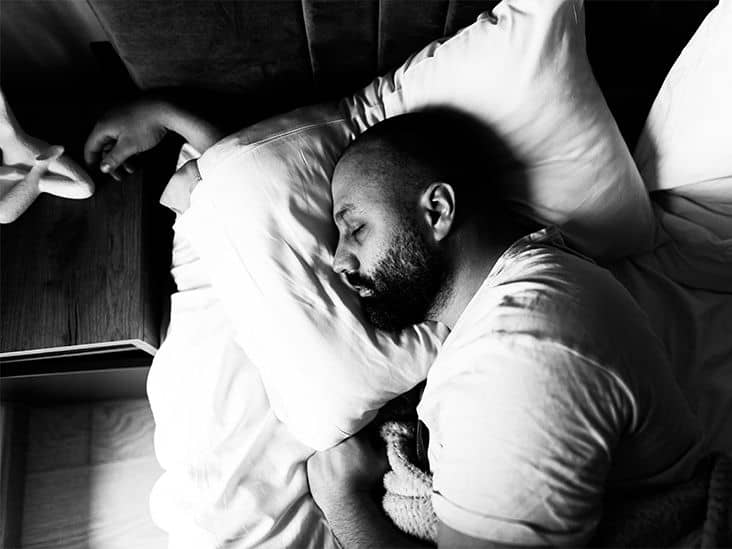
Sleep apnea: Natural home treatment – Medical News Today
We include products we think are useful for our readers. If you buy through links on this page, we may earn a small commission. Here’s our process.
Medical News Today only shows you brands and products that we stand behind.
There are some ways people can help manage obstructive sleep apnea at home. These include losing weight, making lifestyle changes, and changing sleep position.
Obstructive sleep apnea is a condition where a person’s upper airway becomes partially or completely blocked.
This obstruction causes the person to experience pauses in breathing while they sleep, usually due to the relaxation of the muscles in the back of the throat. These are the muscles that help keep the airways open.
According to a
Sleep apnea may come with complications, such as heart disease and high blood pressure. It would be helpful for people with moderate or severe sleep apnea to seek medical treatment to avoid these serious complications.
People with mild sleep apnea may also benefit from medical treatment, but the evidence on this subject remains inconclusive. There is no clear cutoff point for classifying sleep apnea as severe rather than moderate and for determining whether it requires medical treatment.
However, increasing evidence suggests that treatment can improve quality of life in people with mild sleep apnea.
Traditionally, doctors treat sleep apnea by having a person wear a special device called a continuous positive airway pressure (CPAP) machine. This machine fits over the mouth or nose and provides extra positive airway pressure to keep the airways from collapsing while a person sleeps.
For mild obstructive sleep apnea, a person may try the following natural remedies at home:
For some people, carrying excess body weight can increase the risk of sleep apnea. In particular, excess fat in or around the neck can potentially impair a person’s breathing and worsen sleep apnea.
Working toward a moderate weight could be a good first step in treating obstructive sleep apnea. Some steps that a person can take to lose weight include:
Read about 10 great tips for weight loss.
In addition to lifestyle changes that promote weight loss, changes to other habits could help a person reduce the symptoms of sleep apnea.
Some examples of healthy lifestyle changes include:
These habits can help reduce the number of apnea episodes and the associated symptoms in some people with sleep apnea.
One of the most common approaches to home remedies for sleep apnea is a body positioning pillow or another similar device. These positioners, as a form of positional therapy, work by keeping a person from sleeping on their back. People who have obstructive sleep apnea are more likely to have episodes when they sleep on their back.
One example is a side sleeping backpack, which is a vest-like clothing item with a bulging part on the back. If a person tries to roll over onto their back when wearing the backpack, they cannot maintain the position and must turn to one side or the other.
Some people may prefer to make their own positioner by securing a tennis ball or another item onto their back that keeps them from turning while sleeping.
However, in an older study, half of the participants snored more frequently when using the positioner. Chronic snoring can damage the tissues in the upper airways, so this may not be a good solution for everyone.
According to older research from 2017,
People will be able to achieve this position by sleeping in a bed or chair that has an adjustable upper portion. Alternatively, they can use pillows or purchase a body wedge for their torso to keep their head elevated.
You can purchase a body wedge pillow for sleep apnea.
A review of research studies shows that playing a wind instrument and singing may have a small but positive effect on obstructive sleep apnea.
While these remedies may seem unusual, some data exist to back it up. A Journal of Clinical Sleep Medicine review cited an earlier study that found that participants who played the didgeridoo had reduced daytime sleepiness and apnea episodes compared with people who did not play.
The didgeridoo is a wooden wind instrument from Australia. Playing the didgeridoo requires using a special breathing technique that may help strengthen the muscles in the upper airway. In this way, practicing the instrument may reduce sleep apnea episodes.
Other studies cited in this review show that players of a double-reed instrument, such as the oboe and the bassoon, have a lower risk of obstructive sleep apnea, and that singers snore less compared with those who do not sing.
Another home remedy for sleep apnea is wearing an oral device that holds the tongue or jaw in a certain position to help facilitate better breathing.
However, in most cases, an oral device will require a prescription, and a dental professional who has training in sleep medicine will need to fit it.
To discover more evidence-based information and resources on the science of healthy sleep, visit our dedicated hub.
Doctors have identified several factors that contribute to obstructive sleep apnea. These include:
Most people who have obstructive sleep apnea snore. They may have a partner or loved one who tells them that they snore loudly. Even if a person with sleep apnea does not snore, they may experience other symptoms, such as excessive daytime sleepiness, problems concentrating, or memory problems.
A person may wish to discuss their symptoms with a doctor, who will usually recommend a sleep study. The study may require the person to spend the night at a special facility, where medical professionals will monitor how often they stop breathing while sleeping, as well as their oxygen saturation and heart rate. However, home sleep tests are also a possibility and are increasing in use.
A person should note that snoring does not necessarily mean they have sleep apnea.
Although snoring is an indicator of sleep apnea, a sleep study can help a doctor determine whether a person has enough episodes of disordered breathing, or stoppages in breathing, for sleep apnea to be present.
If a person has problems with excessive daytime sleepiness — for example, if they fall asleep at work or school — it is best to speak with a doctor. They should also contact their doctor if a loved one witnesses them frequently stopping breathing while they sleep.
Sleep apnea can be a serious condition. When a person stops breathing, the heart works overtime to pump blood through the body to provide the oxygen that the body does not get during apnea episodes. This extra work can damage the heart and lead to high blood pressure and heart rhythm problems.
Besides prescribing the use of a CPAP machine, doctors may also recommend surgery to treat sleep apnea, especially in children with enlarged tonsils and adenoids. A doctor can remove these larger structures at the back of the throat to improve airflow.
Learn more about sleep apnea and its potential complications.
Sleep apnea is a condition that can affect a person’s quality of life and physical health.
Home remedies, such as making healthy lifestyle changes and elevating the head at night, may help reduce episodes of apnea.
However, if a person has moderate or severe sleep apnea, they should consider speaking with a doctor. They will probably need to wear a CPAP device to support their breathing.
Last medically reviewed on October 24, 2023
Share this article
OUR BRANDS
